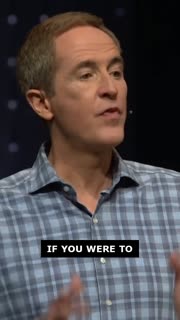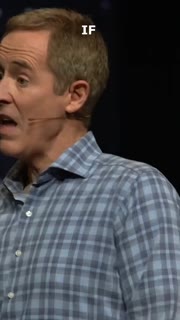Mastering Money: The Power of Self-Control
Devotional
Sermon Summary
Bible Study Guide
Sermon Clips
1. "If our money could actually talk and our money began to give us financial advice, none of us, for the most part, would be shocked about the advice that our money would give us. The shocking thing is the parallel between what our money would say if it could talk and what Jesus did say when he said, he did talk. As we talked about last time, Jesus said more about money and possessions than he did about heaven." [01:00] (25 seconds)
2. "I can add meaning to your life, but I'm not the meaning of life. I can add meaning to life, to your life, but I'm not the actual meaning. That money becomes most meaningful when you begin to view it and you begin to use it as a means to an end that isn't you." [02:15] (19 seconds)
3. "Your self-control determines which one of us or which of us gets control. Your money would tell you, you know, by the way, this isn't about how much you have, this is about what you do with it. Your self-control is actually gonna determine which one of us gets control." [03:18] (14 seconds)
4. "If you were to sit down with over half the world's population and explain how much money you make and how much pressure you feel, they would look at you like you are crazy because in the context of what happens in the rest of the world, we are so ridiculously well-off, and so ridiculously wealthy, but because we have no margin, we feel financial pressure that half the world will look at us and say, if I made that much money, I wouldn't feel any pressure." [04:24] (28 seconds)
5. "The fruit of the spirit, that is the outcome of saying yes to that internal nudge is actually things that you want your sister-in-law to have more of, your brother-in-law to have more of, your children to have more of, your fiance to have more of, your boyfriend, your girlfriend, your husband, your wife to have more of, and your heavenly father would like for you to have more of it too. The fruit of the spirit is this, it's love. It's joy, it's peace, patience, kindness, goodness, faithfulness. And then here's our phrase, our compound word, and self-control." [07:09] (30 seconds)
6. "Isn't it amazing how quickly, how easy it is to take our sorrows to God and give our sorrows to God. In fact, most of you probably like me at some point in your life, you gave your entire eternity to God. You prayed a prayer that went something like this. Dear heavenly father, thank you for this day. Cause that seems like we have to say thank you for this day, but anyway, let's get down to business. Okay. I don't, I want to go to heaven and I've been told that if I don't even have to sign anything, I just have to read this. Dear heavenly father, I asked Jesus to come into my heart and forgive me of my sins." [15:00] (29 seconds)
7. "If you haven't surrendered what you have, you haven't really surrendered. If, if, if you haven't, given him access to what you have, he doesn't have access to you. You have opted for the lesser master. And Jesus addresses this. I mean, Jesus addresses this, this head on. He addresses this, this tension between that. Some of you are feeling right now that some of us are feeling right now. And he does. So it's so cool because he's so smart and he's so practical." [16:24] (32 seconds)
8. "Seek ye first the kingdom of God. Seek ye first the kingdom of God and his righteousness. And by the way, I love you. And all these things that you worry about, all these things that you fret about, all these things that have to get done, all these things that have to be paid for, all these things that are crucial to being able to survive in whatever century we live in, for us, the 21st century. He said, they're going to be given to you as well. This isn't either or. This is one. And two, this is first and second, because somebody's kingdom has to come first." [24:54] (37 seconds)
9. "If Matthew was correct, if Mark was correct, if Luke was correct, if John was correct, if Peter was correct, if James, Jesus' brother who decided his brother was his Lord is correct, then the wisest thing you could do, the smartest thing you could do, the most thoughtful thing you could do is to flip this script. So it's seek ye first living, that you give first. You save for your kingdom second, and then you live on whatever is left over." [27:47] (43 seconds)
10. "The litmus test of our devotion to God is our willingness to put him or others first in the arena of our money and our possessions. Not include them, not include them or factor them in to put them first in the arena of our money and our possessions. So if you're not already doing this, I want to issue you a two-month challenge. And I want to issue this to those of you who are Christians. If you're a Jesus follower, I mean, you're obligated. I mean, not because I'm telling you, but because of what Jesus said." [30:55] (33 seconds)
Ask a question about this sermon
2. "I can add meaning to your life, but I'm not the meaning of life. I can add meaning to life, to your life, but I'm not the actual meaning. That money becomes most meaningful when you begin to view it and you begin to use it as a means to an end that isn't you." [02:15] (19 seconds)
3. "Your self-control determines which one of us or which of us gets control. Your money would tell you, you know, by the way, this isn't about how much you have, this is about what you do with it. Your self-control is actually gonna determine which one of us gets control." [03:18] (14 seconds)
4. "If you were to sit down with over half the world's population and explain how much money you make and how much pressure you feel, they would look at you like you are crazy because in the context of what happens in the rest of the world, we are so ridiculously well-off, and so ridiculously wealthy, but because we have no margin, we feel financial pressure that half the world will look at us and say, if I made that much money, I wouldn't feel any pressure." [04:24] (28 seconds)
5. "The fruit of the spirit, that is the outcome of saying yes to that internal nudge is actually things that you want your sister-in-law to have more of, your brother-in-law to have more of, your children to have more of, your fiance to have more of, your boyfriend, your girlfriend, your husband, your wife to have more of, and your heavenly father would like for you to have more of it too. The fruit of the spirit is this, it's love. It's joy, it's peace, patience, kindness, goodness, faithfulness. And then here's our phrase, our compound word, and self-control." [07:09] (30 seconds)
6. "Isn't it amazing how quickly, how easy it is to take our sorrows to God and give our sorrows to God. In fact, most of you probably like me at some point in your life, you gave your entire eternity to God. You prayed a prayer that went something like this. Dear heavenly father, thank you for this day. Cause that seems like we have to say thank you for this day, but anyway, let's get down to business. Okay. I don't, I want to go to heaven and I've been told that if I don't even have to sign anything, I just have to read this. Dear heavenly father, I asked Jesus to come into my heart and forgive me of my sins." [15:00] (29 seconds)
7. "If you haven't surrendered what you have, you haven't really surrendered. If, if, if you haven't, given him access to what you have, he doesn't have access to you. You have opted for the lesser master. And Jesus addresses this. I mean, Jesus addresses this, this head on. He addresses this, this tension between that. Some of you are feeling right now that some of us are feeling right now. And he does. So it's so cool because he's so smart and he's so practical." [16:24] (32 seconds)
8. "Seek ye first the kingdom of God. Seek ye first the kingdom of God and his righteousness. And by the way, I love you. And all these things that you worry about, all these things that you fret about, all these things that have to get done, all these things that have to be paid for, all these things that are crucial to being able to survive in whatever century we live in, for us, the 21st century. He said, they're going to be given to you as well. This isn't either or. This is one. And two, this is first and second, because somebody's kingdom has to come first." [24:54] (37 seconds)
9. "If Matthew was correct, if Mark was correct, if Luke was correct, if John was correct, if Peter was correct, if James, Jesus' brother who decided his brother was his Lord is correct, then the wisest thing you could do, the smartest thing you could do, the most thoughtful thing you could do is to flip this script. So it's seek ye first living, that you give first. You save for your kingdom second, and then you live on whatever is left over." [27:47] (43 seconds)
10. "The litmus test of our devotion to God is our willingness to put him or others first in the arena of our money and our possessions. Not include them, not include them or factor them in to put them first in the arena of our money and our possessions. So if you're not already doing this, I want to issue you a two-month challenge. And I want to issue this to those of you who are Christians. If you're a Jesus follower, I mean, you're obligated. I mean, not because I'm telling you, but because of what Jesus said." [30:55] (33 seconds)










